|
|
 |
|
|
|
Rob’s Story
|
|
Copyright 2000 by Robert Oliver
All rights reserved
|
|
Hi, my name is Robert Oliver, and I was diagnosed with Hepatitis C in March of 1999. Shortly afterwards, I was referred to a gastroenterologist who performed a liver biopsy and prescribed a six
month regime of Rebetron combination therapy. During treatment, my ALT levels elevated from an initial 200 to nearly 1000, and for the first time in my life, I experienced "right
quadrant pain". Although I didn't know it at the time, this pain was to become my constant companion. Therapy was discontinued in November of 1999, almost exactly five months after it
began. A genotype test revealed the virus to be type 1B.
|
|
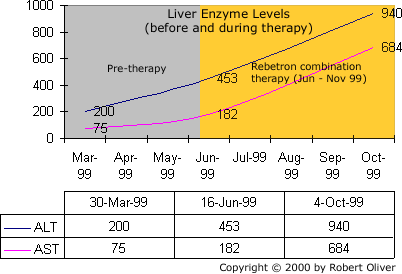
|
|
Having failed therapy, I was referred to yet another doctor. This time, a research hepatologist told me that I had a mild case, and that he wanted to monitor me over the course of the next few
months. For seven months following the termination of therapy, my liver enzymes remained extremely elevated.
|
|
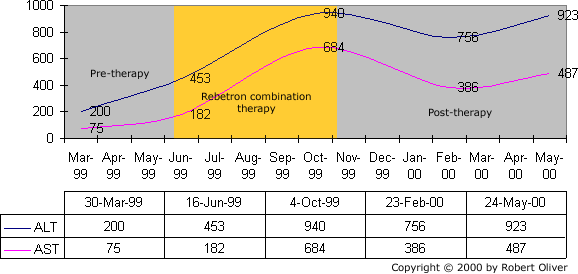
|
|
Because my liver enzymes remained high, my hepatologist recommended a special blood test and a second liver biopsy to rule out autoimmune hepatitis. Just before my biopsy was scheduled, my sister
sent me Lloyd's book, "Triumph Over Hepatitis C." I read it cover to cover the night I received it, and for the first time became angry at the way my illness was being managed. Both
the blood tests and the second biopsy were negative for autoimmune hepatitis, but the biopsy indicated that I had progressed to Stage II, with moderate fibrosis now present. My doctor called me at
home one evening with the news, and told me that he did not know what more he could do, and that I should "hang in there." Anger quickly transformed into determination, and with that
determination, I slowly started piecing together a plan to overcome the disease to spite my doctors.
The first order of business was to get educated on alternative therapies. I ordered a
number of books from Amazon.com.
For the first month, as I began to examine the use of supplements, I started introducing some simple, though substantial, changes into my life. I'm sure that
some of these are not new to a lot of you, but until I did the reading myself, no one had told me any of this (not even my gastroenterologist). Here's what I did:
|
|
Eliminated all of the following:
|
- Alcohol (this wasn't a problem--I don't drink anyway)
- All red meat (I now get my protein from chicken, fish, nuts, and legumes. I used to eat lots of soy, but now I'm having second thoughts about it--you be the judge: Soy Online Service)
- All refined sugar (replaced with very moderate amounts of honey)
- All fried foods (and foods sautéed in oil)
- All dairy products (milk, cheese, cottage cheese, sour cream and even yogurt)
- Anything and everything with "partially hydrogenated" anything on the label
- Canola oil, safflower oil, corn oil, soybean oil, vegetable oils and all shortenings
- Commercially processed cereals (some are very high in iron--toxic to your liver!)
- Grocery store-bought bread
- Started using extra virgin olive oil in all my cooking (use only "Extra Virgin" or forget it!)
- Poached (with water and olive oil) instead of frying until brown
Baked all my own bread
- Drank a gallon of distilled or filtered water (with a fresh lemon squeezed into it) each day
- Reduced stress in all areas of my life...
- Cut work back to eight-hour days (instead of 10 to 12 hour days)
-
Informed my friends (and some coworkers) about my illness, which greatly reduced the stress of hiding it from them. I was surprised to find that everyone has been nothing less than extremely supportive!!!
- Started learning to play the piano (yeah!!!)
- Increased sleep from six to eight hours.
- Began taking milk thistle as a supplement three times daily
- Started my own form of relaxation meditation.
- Resumed my exercise program (just walking, for now)
- Began reading anything and everything I could get my hands on regarding hepatitis and diet!
|
|
|
|
The more materials I read on the subject, the more astounded at our modern medical community I became. I found it amazing how the emphasis was placed on finding the "silver bullet" with
absolutely no priority given to "wellness." I met with my primary care physician, and we spoke at length about this. She agreed to monitor me closely while I put together a herbal
regimen. We took "post-biopsy" baseline enzyme levels, and I was surprised at the difference that the changes I introduced just a few weeks earlier had made:
|
|
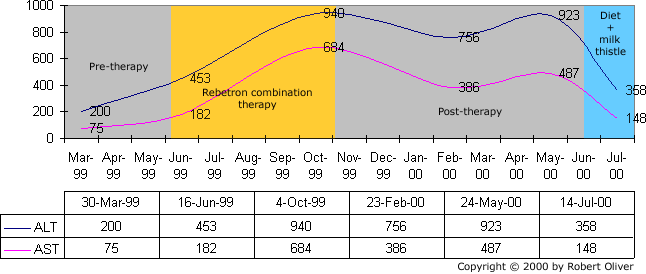
|
|
Not bad for some simple lifestyle changes, huh? The "right quadrant pain" was almost completely gone (not completely, but almost!) Despite the fact that this represented a huge
leap forward, I decided to go ahead with the additional supplements. Having progressed from Stage I to Stage II in one year, I didn't want to see Stage III anytime soon! After about a week of
shopping around, I decided to purchase some supplements directly from Lloyd. I ordered enough to last me a couple of months. It was fairly expensive (in the thousands!), but having progressed
so quickly to Stage II, I was well motivated. My original regimen was as follows:
|
|
|
|
Alpha Lipoic Acid, 200 mg 2x daily.
Selenium, 200-400 mg per day.
Siliphos, 2 caps 3x daily
MGN3, 2 caps 3x daily
Hepastat, 2 caps 3x daily
Hepata Trope, 2 caps 3x daily
Vitamin C, 2000 mg 2x daily
Vitamin B complex, 125 mg 2x daily
A multivitamin (without iron) 1x daily
Aloe Vera juice, 1/2 cup 2x daily
Frozen Thymus Extract, 1 vial every other day
Frozen Liver Extract, 1 vial every week
|
|
Milk thistle seed tea, about a quart per day
Hissop tea, about a quart per day
Reishi mushroom tea
|
|
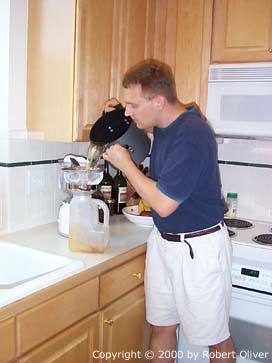
|
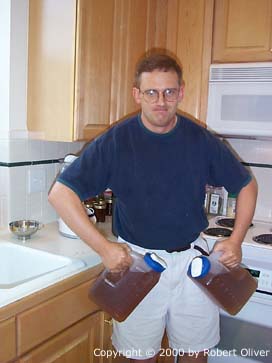
|
|
|
|
Pouring the tea! Careful... careful....
This ought to last for a while--"Hooah!"
|
|
After one month, it was time for my next liver enzyme test:
|
|
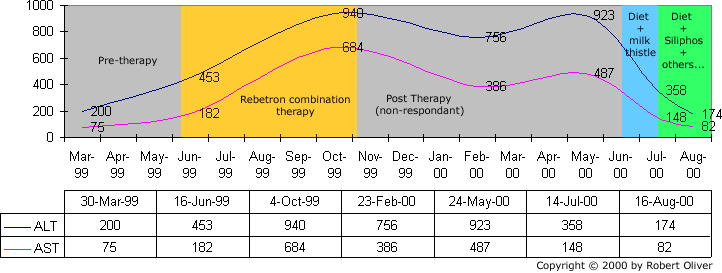
|
|
As far as I was concerned this was cause for celebration! It actually looked like things were on the mend! Not only was I not taking prednisone, but my "right quadrant pain" was
completely gone! (The pain does return if I'm under stress, as was the case while waiting for these results--that's when it feels like a muscle "flexing", as Lloyd puts it. I've
learned to listen to it.)
So, what did my primary care physician think about all this? She was actually quite supportive, but did raise some issues that I think it only fair to pass
on (and besides, I've always enjoyed playing devil's advocate). She wasn't worried so much about the fact that I was taking supplements, but she would have preferred me to approach this with a bit
more of a scientific method (i.e., introduce less expensive forms of supplements first--especially the thymus, as well as introduce supplements slowly--seeing what is effective, and what is not).
Her main concern was that I decided to immediately go with the full gamut of supplements (some very expensive). By doing this, I introduced a bias which may encourage other people to make the same
kind of monetary commitment. After all, not everyone has access to the money needed to do this--especially true for individuals with chronic illness. She also mentioned that it is quite
possible that my enzyme levels may have continued to drop with only the lifestyle changes I had adopted. By suddenly introducing the supplements, there was no way to tell.
These
were valid points, and accordingly I'm not sure that I would advise someone else to jump headfirst into using all the supplements I decided to take. It is a personal decision, and some serious
thought should go into it. Also, I would definitely advise against jumping onto the supplement wagon until you've done your own reading and research (as I did--and continue to do).
Nonetheless, my personal reasons behind my decision to proceed were as follows:
|
- I had progressed from Stage I to Stage II within the span of one year. The significance of this only hits home when you consider that this disease is only graded to four stages. One, two,
three, four--and that's all she wrote! At this rate, I would begin showing signs of cirrhosis rapidly--yikes!
- If I had introduced new supplements one at a time (say, once a month), I reasoned that it would be possible that I might see delayed results from a supplement months down the road, and mistakenly
attribute future results to another supplement more recently added to the regimen. For example, the effects of the glutathione, a crucial antioxidant, can take weeks to months to see the full
benefit.
- It is possible that one supplement alone may not be as effective as that supplement in conjunction with another supplement. As an example, I have found in my further reading that alpha lipoic
acid, selenium, as well as vitamins B2, C, and E are cofactors in the production of the antioxidant glutathione.
- I wasn't doing this to prove or disprove a hypothesis (i.e., this wasn't a science experiment to me). My goal was clearly and without question to get well. I was willing to do whatever it
took to see this through, including sacrificing any chance of ever having any retirement funds, as well as putting myself in debt. I am certainly in debt now; however, considering the
alternative, the price is worth it!
|
|
I firmly believe that while the basic changes I've made and the supplements I've added have played a role in my success to date, there was another overriding factor that cannot be denied. This is
something that you simply must do if you want to beat this disease, or any other, for that matter. I don't know how to say this other than to just come out with it: you must make a conscious
decision to take charge of your own health. I'm not saying that you should abandon your doctor and jump head first into something you aren't prepared for. This is more of change in mindset
than anything else. Put another way, you have to stop being a victim of your illness.
When I was first diagnosed, one of the first thoughts that popped into my head was "Hepatitis
C? No problem. I'll go through the therapy my doctor puts me on, and he's going to cure me, and then my life will be back to normal." The doctor was going to "fix" the
problem. I just knew it. After all, he's the expert, and that's what he's paid to do, right? I'm sure that countless others have approached this in a similar manner, only to feel
disappointment when therapy failed, or worse--despair.
My entire attitude was, in effect, a form of denial. It utterly and completely released me from having to take any
responsibility or accountability for this illness. I didn't even have to acknowledge that I had it! The illness was the doctor's problem, not mine. Reinforcing this subtle form of
denial was my desire not to tell my friends. After all, if nobody knew about it, I could ignore it, and it wasn't a problem! I have since learned that this was entirely the wrong approach to
take with this disease. This wasn't something that was just going to "go away." I had to deal with it, and I needed to pull in every resource I could--including (and especially!) my
friends.
My next hepatic enzyme test is coming up in a few weeks. While I'm hopeful to see a continued drop, I will not become discouraged if I see a rise in my enzyme levels. On the
contrary, I will only serve to firm my resolve, and I will be stronger for it. If I need a shoulder to cry on, so be it. I now know my friends are there for me, and I can always rely on their
strength when I lack the strength myself!
Oh yes, I mentioned that I started making my own bread. That decision came after reading the list of ingredients found in my favorite grocery
store-bought brand. Here's are two original recipes of my own that are absolutely delicious! I've sent them to Sandra Cabot's cook, who writes recipe's for Sandra's book. If I get
feedback, I'll pass it along next time. One thing I can tell you about this bread is that it doesn't seem to mold easily. I can only account for this by noting that the recipe is loaded with
honey (or maybe it's all the sulfites I add to it--just kidding!) These recipes will each make two loaves. After the second rise, cook at 325° F for 30 to 35 minutes.
|
|
Rob's White Bread
1 cup Filtered water
1/2 cup Soy or almond milk (see Soy Online Service)
4 cups Bread flour (King Arthur brand is the best, in my opinion :-)
2 tsp. Sea salt
4 tbsp. Honey (I just estimate the amount, typically erring on the side of more :-)
2 tbsp. Extra virgin olive oil (also estimated while pouring it in)
2 tsp. Yeast
|
|
This was the first variation of white bread I came up with, and when I started cranking these puppies out, my family and friends took to them like seagulls to the last herring. I could hardly keep
up with the demand! They were good--really good. After further experimentation, I came up with a recipe for white-wheat. It's probably a lot better for you than the white, and is
absolutely incredible when toasted and topped with a small amount of honey. The dough for this second recipe will be a little gooey, but I found that I like the resulting bread texture better that
way. You can add a few tablespoons more flour if you find it unmanageable. I've stopped making the white bread altogether in favor of this one:
Rob's White-Wheat Bread
1 cup Filtered water
1/2 cup Soy or almond milk (see Soy Online Service)
2 3/8 cups Bread flour (King Arthur brand is the best, in my opinion :-)
1 cup White-wheat flour (again, King Arthur rocks!)
5/8 cup LSA (see below)
2 tsp. Sea salt
4 tbsp. Honey (again, estimated, and I've started just pouring it in until it "looks
like enough", and then add more)
2 tbsp. Extra virgin olive oil (also estimated while pouring it in)
2 tsp. Yeast
|
|
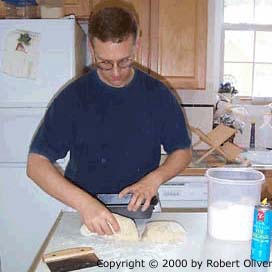
|

|
|
There is one ingredient mentioned above that you may not have heard of: LSA. My family and friends affectionately refer to it as "Lisa". The recipe is from "The
Liver-Cleansing Diet" by Dr. Sandra Cabot. It is reprinted in its entirety by permission from Dr. Cabot (thanks Sandra!):
|
|
LSA
LSA stands for Linseeds, Sunflower seeds, and Almonds. To make it, use:
3 cups linseeds (flaxseeds)
2 cups sunflower seeds
1 cup almonds
Mix and grind
together until fine. A regular coffee grinder will do the job. Store in a dark airtight glass jar in the refrigerator.
This mixture has a slightly sweet and nutty taste and can be
sprinkled on rice, pasta, fruit, vegetables, or just about anything. It is a good source of protein, essential fatty acids, minerals, and fiber and is definitely an anti-ageing mixture.
|
|
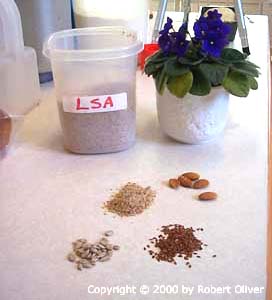
|
|
Incidentally, you've probably noticed the copyright notice at the top, right? Well, I am in the process of writing a book myself--about what I've learned from this disease, and about all the
blessings it has brought to my life (yes, you heard correctly--I said blessings!). It includes all the information above, but in much more detail and with all the other much more interesting bits
that have been left out of this story. Much of it is actually quite humorous, while other parts bring back vivid memories of the biopsy procedures, and the interferon therapy. I have found
writing to be a very demanding task, but also equally fulfilling. I'm including my other recipes, photocopies of my lab results, and more importantly, the psychological journey that led me to
decide to tackle this thing head on. To this end, I have formally submitted this document along with my other manuscripts for copyright. If you desire to use the images or text I've presented
here, please ask (thanks!)
You may be wondering why I haven't given out an email address. Well, I'll be honest--I'm still in the process of healing, and I don't think I could bear the stress
from the guilt of not being able to reply to each and every email. Healing, like any other task, takes energy, and right now, I need to keep focused on this as a singular goal. Once my health
and strength have fully returned, I may decide to play a more interactive role. For now, I will simply update everyone through my monthly reports to Lloyd.
Speaking of Lloyd, I would
like to express my most profound gratitude to him for encouraging me to write this and allowing me to publish my story on his web site. It was his book that was the spark that started my own
journey, and I am very grateful for that. And I certainly must also thank my sister for introducing me to Lloyd's book in the first place. I would like to recognize Lloyd's God-Daughter,
Aunika, for the wonderful ray of sunshine that she is!
It has truly been my pleasure to share with you this little slice of my life, and I hope you find the information useful. More so, I
hope my story helps others to find the courage to embrace this disease (and if you want to know why I specifically chose the word "embrace", read Dr. Weil's book!). I know that together
we can beat this thing. Talk to you in a few weeks!
Best regards,
Rob
|
|
Return to Message Area
|
|
|
|
|

